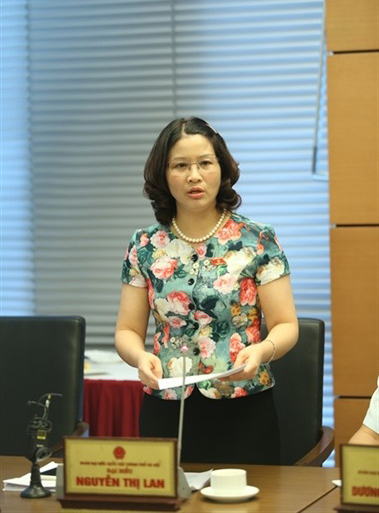‘Tam Nong[i]’is facing both great opportunities and challenges”; therefore, Vietnam needs to develop a smart agriculture based on knowledge, apply high technology to efficiently utilize resources, improve productivity, quality, added value and sustainable development, Prof. Dr. Nguyen Thi Lan, President of Vietnam National University of Agriculture (VNUA), stated at the National Assembly Meeting.
Emphasize students' autonomy capacity
Prof. Lan added that to develop modern agriculture and rural civilization, it needs a convergence of determinants, in which the training of high quality human resources is a prerequisite in all countries.

Prof. Dr. Nguyen Thi Lan addressed at the National Assembly Meeting
| Thailand, a neighboring country of Vietnam, has advanced agriculture, exports seeds and processed agricultural products to many high value markets. Identifying the most important factor in the development of Thai agriculture 4.0 is the human factor, the Thai government has established a system to integrate education, training and career development for the Thai people to match with the future career orientation of the learner. |
| In its development strategy, VNUA identifies scientific research and technology transfer as important components in improving the quality of human resource training and the development of the new rural area construction program. Therefore, VNUA has concentrated its resources to research on new technologies, create many products to partly contribute to the agricultural restructuring and the new rural area construction program, and to raise the students’ capacity in scientific research and technology transfer. |
According to the Vietnam Human Resources Development Plan for 2011-2020 approved by the Prime Minister, the percentage of trained labor force in agriculture, forestry and fishery will increase from 15.5% in 2010 to about 50% by 2020. However, it is forecasted that by 2020, the human resources of this sector will lack about 3.2 million trained workers. Not only that, Vietnamese agricultural labors are at high age and lack of high-tech skills. Also, the World Bank data indicates that the quality and the competitiveness index of human resources in Vietnam are still very low, compared to other Asian countries.
Prof. Lan also added that today's university graduates need not only good knowledge but also the skills, especially creativity, cooperation, and critical thinking to not be replaced by robots and artificial intelligence. Moreover, autonomy is also crucial for graduates to adapt to the rapid changes of working environment.
International experiences have shown that agricultural education and research revolution 4.0 is a revolution in the development of ecosystems: training and research, enterprises, close collaboration to create creative research and innovation systems, collecting research data from fields and farmers to create agricultural products 4.0.
The Netherlands is an example of a high-value and agricultural-complex food sector which requires in-depth knowledge and high technology in all components and processes in the production chain. The Netherlands’s high school students can choose agricultural subjects and at higher education level, agricultural students can choose between academic agriculture and academic vocational training.
Identify the actual situation and propose appropriate solutions
Even though human resource development is receiving a special attention from the Party and the State, the training of high quality human resources is facing with various challenges.
Firstly, the structure of trained high quality human resources is still unreasonable. This is reflected in the imbalance between the training levels, training disciplines, training scale and distribution of resources for training. The number of students trained in the university is much higher than those who have been trained at intermediate and professional levels
Secondly, the training scale is not stable and not balanced in the structure of training.
Thirdly, the development of self-control and socialization for training is difficult due to low tuition fees and financial difficulties of learners. Students studying at agricultural universities academic institutions are mainly from farmer families, poor areas, ethnic minorities and poor households.
Fourthly, trained labors often choose not to work in rural areas because of low income and poor working conditions. The prevailing sentiment among high quality workers is that they would prefer to work in urban areas for better paid jobs even if the jobs may not be of their majors.
To make up for these lacks in the labor supply, over the past years, VNUA has cooperated closely with more than 200 enterprises, most of provinces and cities to offer students with internship opportunities so that they quickly apply their knowledge into practical production. VNUA has also established strong cooperation with numerous international partners for short-term training courses for staff and students. In recent years, 400-500 students have been trained and many of them trained in Japan and Israel while about 100 farmer cooperatives have been sent to Japan for trainings.
Translated from Van Hung https://nongnghiep.vn/
[i] TN: Tam Nong is a policy that drives the development of Agriculture, Rural Areas, and Farmers in Vietnam